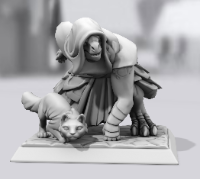
Pending: 12/24: The one-click version of the script seems to have issues that I am unable to identified; however, the "import" version of the script from the library functions as expected. Update 2.0 - Now works with DMG tables! (Huge thanks to Aaron for helping me test the new tables) The script has been completely rewritten and functions with nearly all tables I could think to test excluding a few 'problem' tables that I will list below. Table naming has been improved though a select few can still return lengthy names. Should be ready for One-Click on 12/22 Updates: Table names replace spaces with '_' and removes commas, colons, and parens. Can handle multi-column tables such as Treasure Hoard tables. Can create multiple tables for split dice tables (e.g. Passages table that uses d12 or d20). Works with multiple dice roll tables, but does not create accurate item weights for them (e.g. 3d8) Amended: Now handles specified instances of multiple dice rolls (3d4, 2d6, 3d6, and 3d8) Added a very crude toggle to stop writing handout links when you enter !handoutlinks off, and can turn it back on using !handoutlinks on. This setting does not save once the game is reset. I haven't figured out how to do that part yet. Will now create items/tables when it sees something like "10 or lower" or "3d8+CHA", but still can't account for previous influencing rolls/stats Tables with known issues: Childhood memories: (3d8 + CHA), Running a business (d100+days), Carousing (d100+level): Creates tables but can't account for adjusted weights from previous modifiers. Selling a Magic Item (d100 + mod.) Siblings and Home table from Tasha's Origins (requires subtracting numbers which item weight cannot account for Magic Items Table I, Villains Methods and Schemes , has 'subtables' within the table(I've marked this as too niche to fix for the time being but subject to change) Designing NPC tables that have nested tables, (e.g. Ideals ) Until the update is accepted, you can find the full script here: Github Repo 1.5: Added better table naming handling, specifically for the tables in Tasha's Cauldron of Everything. Now works with every table I could think to test from the compendium. Names can get lengthy, but it's difficult to catch all conditions otherwise. Not yet updated with one-click but available via github link. Set default rolls to whispers. 1.4: Cleaned up the formatting and used better variable naming, replaced crude handler with a cleaner one for endless loop that occurs (setting notes triggering change handout event). Thanks Aaron for the code framework/suggestion for that 1.3: Added better variable handling for links and added " " in front of items that start with digits that aren't rolls. Fixed a bad variable name. Hello all, Now available via one-click install I finished the first version of a script that will search all handouts in your game, check if they contain a rollable table, create that table if they do, then write a link above that table in the handout notes that will roll from that table into chat. Many thanks to The Aaron and Keith for the help/idea for this script. Notes: This is a great way to organize and keep track of mass amouts of roll tables since you can use folders with handouts! Parses all handouts using "!rollhandout" as an api chat command This script was written to work in conjunction with recursive tables but there are standard 'roll' links included along side the 'roll recursive' links. One caveat I haven't addressed is that it will always surround any dice roll with brackets (e.g. 1d6+2 turns into [[1d6+2]]) The script as is will run at the start of a game being launched and scan every handout immediately. If you wish to prevent this, there are lines that can be uncommented. (1, 9, 14, 218, and 222 I believe; they all have comments labelling this feature). The script will parse any handouts that are added. For example, dragging "Arctic Encounters" from the 5e compendium to the game will create a handout, proc the script to make tables for each tier and add a link to that handout automatically. I am unaware of any conflicts at the moment, but if you notice any variable names that might be an obvious conflict I am happy to adjust this. I am very, very new to this so if anything at all stands out as a potential problem or just bad practice I won't be at all offended by it being pointed out. I know some formatting for the chat commands could be improved, but I plan to handle that after some feedback for what people may be looking for, if anything. I hope some may find this script useful and if you encounter any errors please let me know! My tests were run mostly with the standard tables from 5e compendium so it is possible different tables may cause an issue. If you have any suggestions or recommendations for improving this I am more than happy to learn how to implement them if possible. Thanks!




